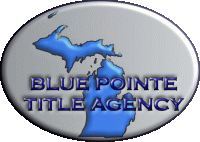7 Things Title Insurance Does Not Cover
- Blue Pointe Title
- Dec 19, 2024
- 3 min read

Title insurance is an important step in protecting your real estate investment. While it typically covers a long list of title defects, it does have limitations.
Here are 7 things title insurance does not cover that you may need to know about.
1. Issues Created After the Policy is Issued
Certain types of insurance, such as automobile or health policies, protect against future events. In other words, you have coverage if you have an accident or get sick tomorrow.
Title insurance does not work this way. Rather, it protects you from things that happened in the past — things that took place before you took ownership that you may not know about yet.
Issues that arise that were created while you are the owner are not covered. For instance, a judgment entered against the previous owner years before the property is transferred into your name will be covered by a title insurance policy. A judgment attached to the property in your name will not.
2. Defects or Repairs Necessary Due to Previous Owners
If you move into your new home and discover that there is work to be done on the property from defects or repairs that should have been made before finalizing the purchase, there is nothing your title insurance policy can do for you. Even if the work done by previous owners is not compliant or was done improperly, it will not be covered.
Title insurance is not a replacement for a home inspection. And it will not protect you against things that should have been caught by one.
3. Condemned Land
Most title insurance policies will state that condemned properties are excluded from coverage. If something happens after you take ownership that causes the structure to be condemned, you cannot file a claim with the title insurance company to get reimbursed financially.
4. Pest Infestations
Title insurance is not effective against any issues concerning the subject property’s condition after the closing. This includes pests of all sizes. For instance, termites can wreak havoc on the wooden areas of a home and can even put its structural integrity at risk.
These issues are not handled by title insurance but may be covered by the homeowner’s policy.
5. Property Line Disputes
Sometimes, title defects can lead to boundary issues that must be addressed. This happens when there is an encroachment on the property, such as the fence of a neighboring property extending onto yours. While some title insurance policies may not protect you in this situation, others will.
Enhanced policies offer a lot more coverage that often includes encroachments. Be sure to talk to your title company to maximize your insurance — and your peace of mind.
6. Changes in Zoning and Land Use
Properties are zoned for certain purposes, such as those that are residential or commercial. How your particular property is zoned will impact how it can be used. And your title insurance will apply accordingly.
However, should your zoning laws change after you already own the property, your title insurance will not likely cover you for any financial losses that result from this issue.
7. Environmental Hazards
Environmental hazards, including soil contamination, are not covered by title insurance. Note that if you discover toxic materials are stored under or on the property, your title insurance policy will not cover the cost of cleanup or remediation.
With all of these things that title insurance does not cover, is buying a policy worth it? Title experts highly recommend the purchase as it can protect homeowners from catastrophic financial loss.
Blue Pointe Title, LLC is Michigan’s title company, committed to providing residential and commercial title services for every step of the closing process, as well as convenient closings and secure transactions. Learn more at www.BluePointeTitle.com.

Комментарии